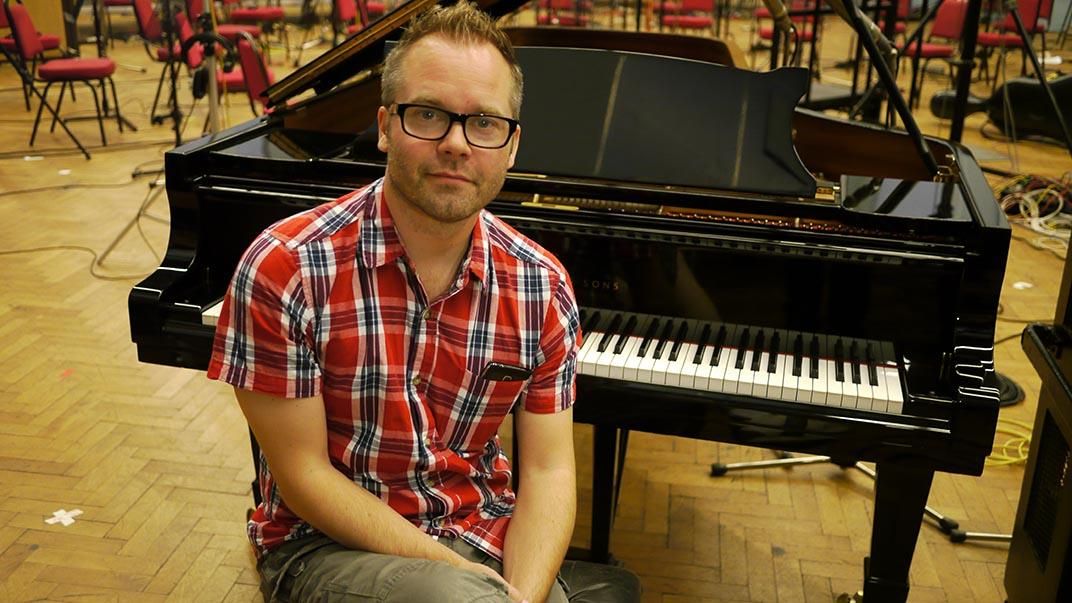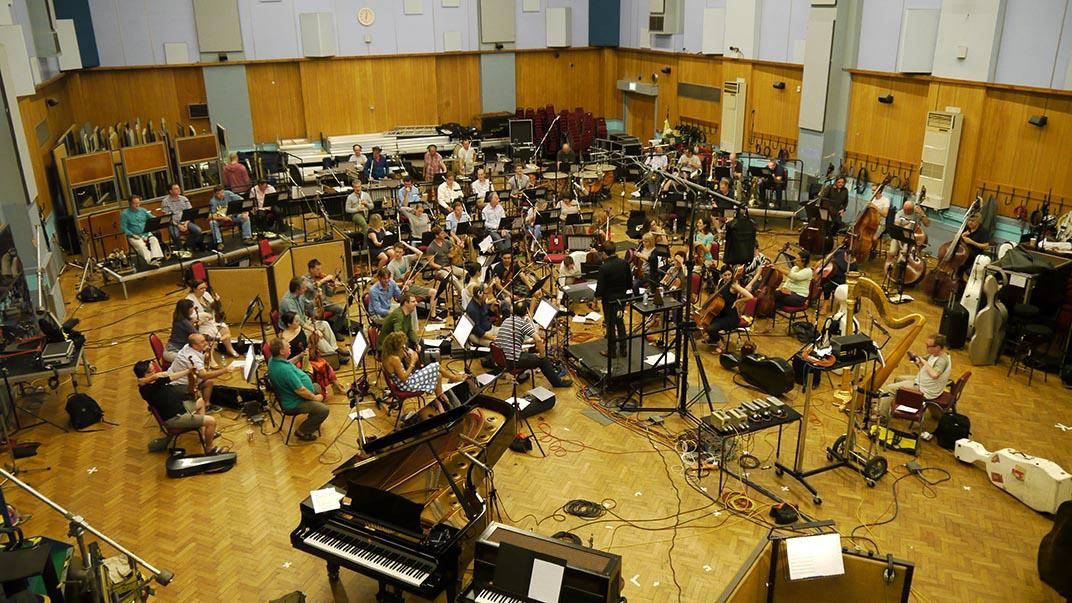Why the Composer of Candy Crush Soda Saga is the New King of Video Game Music
You may have never heard of Johan Holmstrom, but millions listen to his music every day
/https://tf-cmsv2-smithsonianmag-media.s3.amazonaws.com/filer/39/85/39855ccb-b09c-480c-9434-2d254f21b7f3/img_8105edit.jpg)
Abbey Road Studios in London has heard more than its share of memorable music. It's where the Beatles recorded “A Hard Day's Night” and “Revolver,” and where John Williams conducted the stirring themes of the Star Wars films. But a few months ago, the London Symphony Orchestra performed music that's popular on a entirely different platform: the soundtrack for the video game Candy Crush Soda Saga. Its composer, Johan Holmström, has created the music for more than a dozen popular games.
In an era of shrinking audiences for classical music, performers and composers have found an unlikely ally in the simplest and cheapest kinds of video games. Candy Crush Soda Saga is the sequel to one of the most successful casual games ever, King Digital Entertainment's Candy Crush Saga, which was downloaded half a billion times. (“Casual” games are the sort you play for a few minutes on the subway, or waiting in line.) If the sequel continues to succeed on mobile devices and online, Holmström's composition will deliver the London Symphony Orchestra to low-fi laptop speakers and iPhone earbuds across the world.
Holmström is a Swede, but as a teenager he moved the United States to study and perform music. When he returned to Sweden, he spent years touring with funk and jazz groups. He tired of life on the road, however, and decided to leave music in favor of molecular biology and journalism. His second and third careers didn't last long. Soon he was itching to play music for a living again. “I was thinking about how I can make money from sitting inside my studio,” he says. “That's where I love to be.”
It was around that time that Holmström joined Facebook and started reconnecting with old friends. One was a fellow Swede who worked for a company called Gamers First in California. As they caught up, Holmström mentioned that he wanted to make music again. Before the conversation ended, he'd landed his first freelance gig as a video game composer.
Holmström now composes full-time for King Digital Entertainment, which develops easy-to-play, impossible-to-put-down games for mobile devices and the web. His studio in Malmö, Sweden, consists of little more than keyboards, virtual instruments, and software. “Ninety-nine percent of what I do is on the computer,” he says. When he's not composing, he’s editing custom sound effects like underwater explosions and disappearing candy.
For each new assignment, game producers start by bringing Holmström sketches and ideas. He then prototypes music to fit, be it hard rock, electronica, or classical. For Candy Crush Soda Saga, he tried out several iterations of electronic music before landing on his main orchestral theme. In the game, it rises and falls for a brief 7 minutes, but pivots to additional tracks as the player explores new levels.

If you've never heard of Candy Crush, consider this: King is one of a handful of casual game developers valued at over $4 billion. The number of people who play their games each day (137 million) is more than double the population of the United Kingdom (64 million), where the company is headquartered. That's significantly more than play console games on Xbox or Playstation, which generate more revenue per player but require expensive purchases to get started. Candy Crush, by comparison, is a free app that makes its millions from in-game purchases such as extra lives and game bonuses.
These figures mark an important shift. Games like Candy Crush, Angry Birds and Bejeweled have proven that tiny screens can still turn huge profits. As game developers such as King, Rovio, and Zynga have expanded into multi-billion dollar enterprises, they've followed in the footsteps of movie studios and console game companies—by hiring armies of in-house creatives like illustrators, animators and composers.
Video game music really caught on in the 1980s, back when games barely fit onto physical cartridges. Back then, even adding a single melodic line of electronic tones was difficult. But with the advent of 8-bit consoles like the Nintendo Entertainment System (NES), video game music started to diversify into three lines of bass, treble, and sound effects. (Compare this to the recordings for Candy Crush Soda Saga, which featured 67 performers.)
It took a while for game music to mature. According to Karen Collins, a historian of video game music at the University of Waterloo in Canada, many early games included melodies cobbled together by programmers. “A lot of times they would take piano music and just kind of convert it into code,” she explains. “So you have, like, Bach turning up in 80's games—because they just pulled it from public domain sheet music.”
Once technology improved, leaving more storage capacity for audio, music was a missed opportunity. Video games grew more immersive and complex, but soundtracks weren't keeping up. Nintendo was one company to change that, by hiring dedicated composers. One of their early discoveries was Koji Kondo, the Japanese composer responsible for the memorable theme song of Super Mario Bros.
As layered, subtle music became a common feature of games, theme music started to develop its own aesthetic. “For me, good game music really integrates the game and the music,” says Collins. “To pull it out of the game and listen to it—or to play the game with the music off—just ruins the whole experience.”
This makes the soundtrack for a video game different than the soundtrack for a movie, which is a linear medium with a beginning, middle, and end. Game music needs to be fluid and adaptable. Video games in the ’80s and ’90s could last dozens or even hundreds of hours, with a constantly shifting setting and cast of characters. Imagine hearing melodies that simply loop for days on end. In most successful game soundtracks, Collins says, “the music is reacting to what you're doing in the game.”
This was her only complaint with the soundtrack of Candy Crush Soda Saga. “I really enjoyed it,” she says, particularly for its nostalgic atmosphere that seems to echo old movies. “It reminded me very much of 1940's Disney music—perhaps a touch of Fantasia—maybe because of all the tuned percussion and pizzicato strings.” She thought the soundtrack wasn't well-integrated into the game, however, because it plays on a loop under loud sound effects.
You could say this another way: There's still plenty of room for improvement in quite good video game music. These days, technical limits for web and mobile games have been largely overcome. The constraints on composers have more to do with the needs of gaming companies, rather than the number of bytes on a sound chip.

The brave new world of musical possibilities makes Johan Holmström a bit nostalgic. As a kid, he played games on a popular model of 8-bit home computer, the Commodore 64. “I remember it was such a big thing when I had my first Commodore 64,” he says. One of his games, Commando, had music that sounded like 80's dance music converted into frantic beeps, blips, and buzzes. “That was so cool.”
On the other hand, technical improvements also created Holmström's job, since they enabled even casual games to feature rich orchestral scores. So he can't really complain. When the London Symphony Orchestra started performing the music to Candy Crush Soda Saga, Holmström was with his wife in the Abbey Road control room, watching from above. It made both of them tear up. Music hasn't lost the power to do that.


